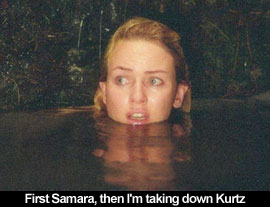Melinda and Melinda (2005) + Head-On (2004)
MELINDA AND MELINDA
**/****
starring Will Ferrell, Radha Mitchell, Chloë Sevigny, Chiwetel Ejiofor
written and directed by Woody Allen
Gegen die Wand
****/****
starring Birol Ünel, Sibel Kekilli, Catrin Striebeck, Güven Kiraç
written and directed by Fatih Akin
by Walter Chaw I was pretty sure that the stultified paralysis of Anything Else would eventually cause me to do myself serious injury and felt fortunate that when the lights came up, most of the intensity of my dislike for the Woody Allen of the last several years dissipated like the details of a bad dream. It's possible to leave the diminutive auteur in the dark, it seems, and such is the fate, too (and not a bad critique), of the more palatable but no less appallingly reductive and juvenile Melinda and Melinda. It's metaphysics by way of Strindberg, of course, and only as good as Allen ever is at capering around his familiar autumnal Manhattan fantasias in his "serious filmmaker" cap. His milieu, his Yoknapatawpha County, has always been the mating rituals of "blocked" artists–often filmmakers casting or directing films within films (What's Up, Tiger Lily?, The Purple Rose of Cairo, Stardust Memories, Crimes and Misdemeanors, Hollywood Ending)–orbiting around one another in impotent, inevitably mortal, orbits. If he doesn't star in them himself, he hires someone to impersonate him–the Woodman is never far from his own lover/hand, and his casts of invariably grateful manqué dutifully take on his cadences and exhortations to debate Bartók and Bergman in airless dinner parties that would drive even Buñuel nuts.

 by Walter Chaw
by Walter Chaw